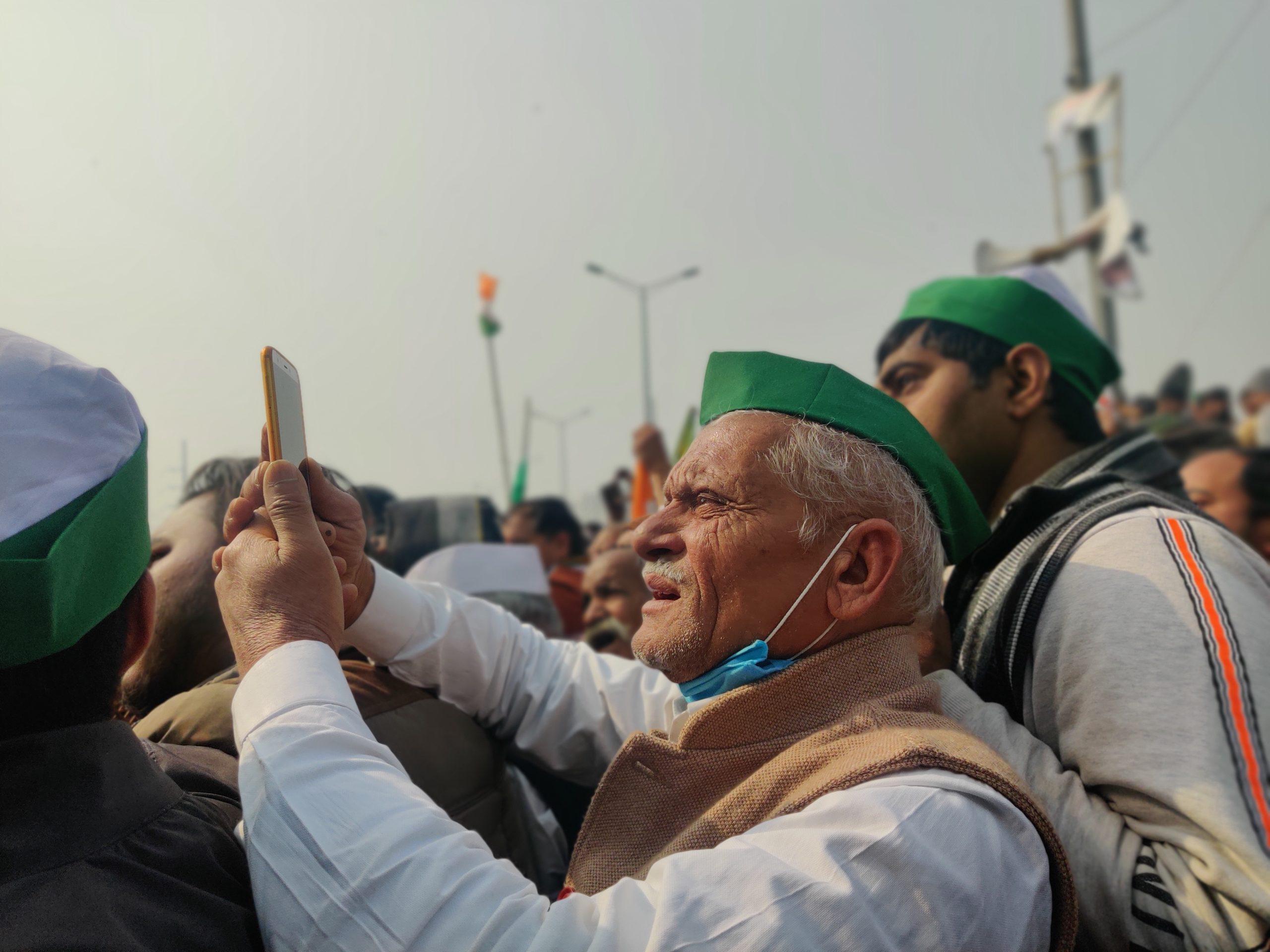
As we took breaks from the unusually hot February sun at Ghazipur border – browsing Twitter – farmers protesting the new farm laws by the Modi government approached us enquiring, “You have network?” Another question we were asked was “Are you on Airtel?”.
Having 3G/4G bandwidth has become an anomaly here, with the Ministry of Home Affairs (MHA) temporarily suspending internet services at the Singhu, Ghazipur, and Tikri borders, where farmers have held on for more than two months now. But interestingly, even when the government banned the networks, some of those on Airtel were still receiving internet signals, including us.
We were also told by farmers that Airtel employees had come to their site in December to get them to port from Jio. This was an effective marketing drive after hearing about the anti-Jio sentiments among protesting farmers.
From the three farm laws, one which is most contentious to the farmers is that which is going to allow the sale and purchase of farm produce outside the Agricultural Produce Market Committee (APMC) mandis. The government regulated marketplace ensured minimum support prices. Farmers believe allowing sale outside this purview would make them vulnerable to big companies.
Farmers accuse the present government of working to benefit companies like Reliance which runs Jio.
This is where the animosity towards the group comes in, and the advantage for companies like Airtel. By September of 2020 the All India Kisan Sangharsh Coordination Committee (AIKSCC) started their protest against Reliance group. By late December, Punjab’s Jio network witnessed vandalism when power supply to about 1,800 towers was cut.
The Reliance group also detected by December that people had started porting their numbers. Writing to the Telecom Regulatory Authority of India (TRAI), they alleged that rivals Bharti Airtel and Vodafone Idea were trying to turn the customers’ perception against it. It said “As a result of aforementioned false propaganda of competitors to affect customer perception, we have been receiving a large number of port out (cancellation) requests”.
Airtel responded saying, “Despite being provoked by some competitors who we know will go to any length to make baseless allegations, adopt bullying tactics and use intimidatory behaviour, we have always conducted our business with character and transparency, something that we are deeply proud of and known for”.
According to TRAI’s latest report, (Bharti) Airtel has seen an increased subscriber growth with a net addition of 3.77 million in September 2020. This was the first time since September 2016 where it has succeeded to surpass Jio.
By November Airtel was leading mobile subscriber growth with a net addition of 4.47 million new customers, followed by Reliance Jio with net addition of 1.9 million.
We also looked at porting requests, which while TRAI does not mention network wise, saw a total number of porting requests from Punjab at 20.07 million in October. This number grew in November with 20.29 million requests.
In Western UP which is close to the Ghazipur border, a total of 26.57 million requests were made in November while in the previous month 25.93 million requests had been made.
We emailed Airtel with a request for a statement on claim by farmers, we have not heard back from them yet.
No network stops them
While some farmers claimed Airtel internet services were working, more complained about how Jio was the only network which wasn’t. We did however find two people who despite using Airtel did not have networks. One of them is Gurveer Singh, who had taken a journey of more than 600 km from Uttarakhand’s Sitarganj to join in protest.
Both his Airtel and Idea networks have refused to connect. “I have to walk two kilometres to make a WhatsApp call,” he told us. The young MA student of Political Science said he took online classes before the internet was blocked, but now his studies would have to take a break. Like many others, he has taken the resolve to stay, “we don’t know till when this will go on, maybe a month, two months, even more”.
Another protestor, Satpal, who works in Bangalore and took two months leave to join in support of the farmers here, tells us the same. But for him, it doesn’t matter if there is any internet or not, eWe don’t need the internet, people here are full of life. If you talk to anyone here, go to an elderly man or woman, they will tell you stories. We are all here together, part of one family.”
The government’s decision to suspend internet – from 11 pm on January 31 to 11 pm on February 2 – came in the face of growing number of protestors at Ghazipur site, which had at first started to wane after January 26. After fresh calls for support rang out, farmers especially from Western UP started joining forces and entering the protest site. Gurveer pointed out that the Central government’s tactic didn’t work, with people joining not just from UP, but also from Haryana, Rajasthan and Uttarakhand, like him.
Now, the likelihood of the protest ending is slim to none, until the government repeals the laws. Bharatiya Kisan Union leader Rakesh Tikait, whose cry for support led to much of the mobilisation said the Ghazipur border protest would continue “till October or November”.
(Cover: Credit – Sashikala VP)
Delhi hosted what organisers describe as the world’s first player auction in golf, launching ‘72…
An elderly woman recalls how her six-year-old granddaughter lay bleeding after a speeding car hit…
Municipal Corporation of Delhi plans a unified policy enabling RWAs to adopt and maintain parks…
A 17-year-old boy allegedly died by suicide after jumping before a moving train at Uttam…
Delhi High Court grants bail to 26-year-old Thar driver accused of mowing down two in…
Two Rohini men arrested for fatally stabbing one person and injuring another during a robbery…